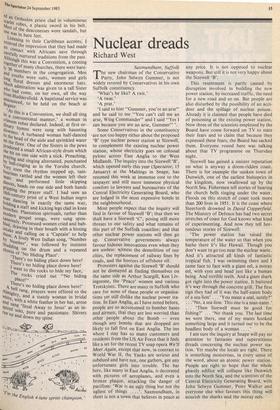Nuclear dreads
Richard West
Saxmundham, Suffolk
The new chairman of the Conservative Party, John Selwyn Gummer, is not widely revered by Conservatives in his own Suffolk constituency.
`What's he like? A twit.'
`A twat.'
'A prat.'
'1 said to him "Gummer, you're an arse" and he said to me "You can't call me an arse, Wing Commander" and I said "Yes 1 can because you are an arse, Gummer"
Some Conservatives in the constituency • are not too happy either about the proposed 'B' type nuclear power station at Sizewell, to complement the existing nuclear power station, whose electricity goes on colossal pylons across East Anglia to the West Midlands. The inquiry into the Sizewell 'B', which opened early this year (Spectator, 15 January) at the Maltings in Snape, has resumed this week at immense cost to the taxpayer and still more immense physical comfort to lawyers and bureaucrats of the Central Electricity Generating Board, who are lodged in the most expensive hotels in the neighbourhood.
Most people expect that the inquiry will find in favour of Sizewell 'B'; that then we shall have a Sizewell 'C', posing still more threats to our safety and what remains of this part of the Suffolk coastline; and that other nuclear power stations will then go up. Conservative governments always favour hideous innovations even when they are useless: witness the demolition of our cities, the replacement of railway lines by roads, and the horrors of offshore oil.
Protesters against the Sizewell 'B' should not be dismayed at finding themselves on the same side as Arthur Scargill, Ken Liv- ingstone, the 'Peace' women and various Trotskyists. There are many in Suffolk who care for none of these people or organisa- tions yet still dislike the nuclear power sta- tion. In East Anglia, as I have noted before, people are so accustomed to bomber bases and airmen, that they are less worried than other people about the Bomb — even though any bombs that are dropped are likely to fall first on East Anglia. The inn where I stay has so many customers and residents from the US Air Force that it feels like a set for the recent TV soap opera We'll Meet Again, except that now, in contrast to World War 11, the Yanks are serious and subdued and have not, one gathers, got any unfortunate girls into trouble. The bar here, like many in East Anglia, is decorated with pictures of aeroplanes, and even a bronze plaque, attacking the danger of pacifism: 'War is an ugly thing but not the ugliest of things . • Saxmundham, in short is not a town that believes in peace at any price. It is not opposed to nuclear weapons. But still it is not very happy about the Sizewell 'B'.
This resentment is partly caused by disruption involved in building the new power station, by increased traffic, the need for a new road and so on. But people are also disturbed by the possibility of an acci- dent and the spillage of nuclear poison. Already it is claimed that people have died of poisoning at the existing power station. Now three of the scientists employed by the Board have come forward on TV to state their fears and to claim that because they expressed these fears, the Board has sacked them. Everyone round here was talking about that TV programme on Thursday night.
Sizewell has gained a sinister reputation on what is anyway a doom-ridden coast. There is for example the sunken town of Dunwich, one of the earliest bishoprics in the kingdom, now swallowed up by the North Sea. Fishermen tell stories of hearing the church bells ringing under the water. Floods on this stretch of coast took more than 200 lives in 1951. It is the coast where Steerforth drowned in David Copperfield. The Ministry of Defence has had two secret stretches of coast for God knows what kind of experimenting. And now they tell hor- rendous stories of Sizewell: `The power station has raised the temperature of the water so that when you bathe there it's like Hawaii. Though you don't want to go too near the nuclear waste. And it's attracted all kinds of fantastic tropical fish. I was swimming there and I came face to face with a giant eel, a moray eel, with eyes and head just like a human being. And terrible teeth. And a giant shark got right into the power station, It battered it's way through the concrete grill. The first sign they had of it was the half-eaten body of a sea-lion' ... 'You mean a seal, surely?' ... `No, a sea-lion. This one is a man-eater.' ... 'Then Sizewell must be good for fishing?' ... 'No thank you. The last time we were there, one of my mates hooked something large and it turned out to be the headless body of a woman ....'
I am sure the inquiry at Snape will pay no attention to fantasies and superstitious dreads concerning the nuclear power sta- tion. Yet maybe the locals are right. There is something monstrous, in every sense of the word, about an atomic power station. People are right to hope that the whole ghastly edifice will collapse like Dunwich into the North Sea, and the scientists of the Central Electricity Generating Board, with John Selwyn Gummer, Peter Walker and everyone else who favours this thing will nourish the sharks and the moray eels.






































 Previous page
Previous page